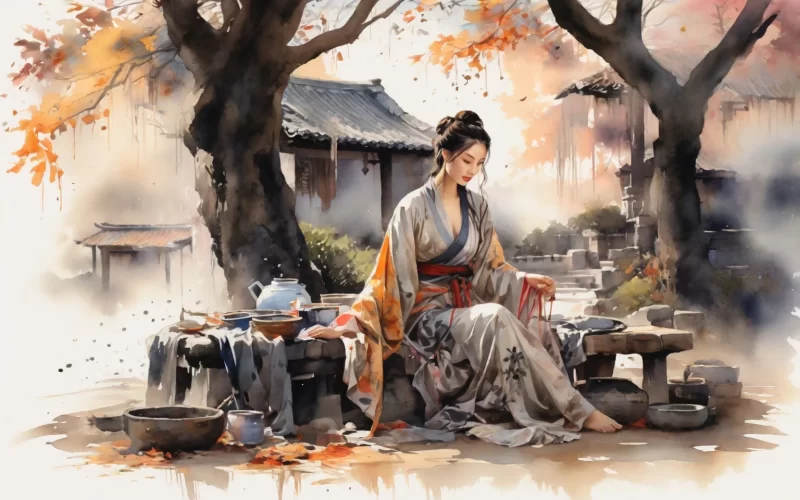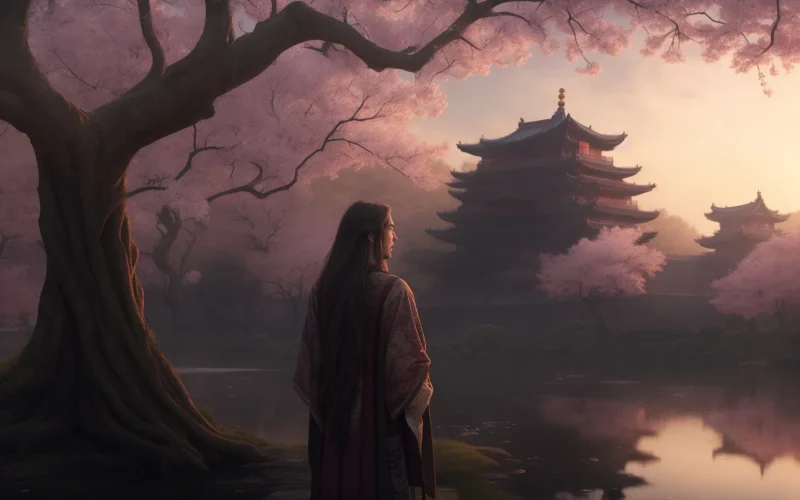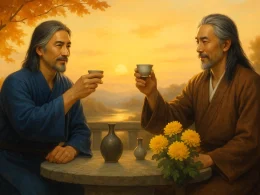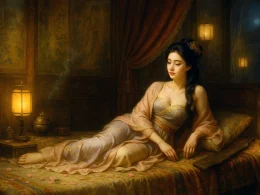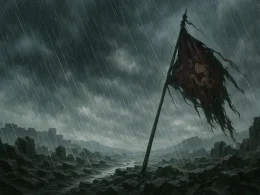Living under a thatch roof, never wearing fragrant silk, She longs to arrange a marriage, but how could she dare ? Who would know her simple face the loveliest of them all When we choose for worldliness, not for worth ? Her fingers embroider beyond compare, But she cannot vie with painted brows; And year after year she has sewn gold thread On bridal robes for other girls.
Original Poem
「贫女」
秦韬玉
蓬门未识绮罗香,拟托良媒益自伤。
谁爱风流高格调,共怜时世俭梳妆。
敢将十指夸针巧,不把双眉斗画长。
苦恨年年压金线,为他人作嫁衣裳。
Interpretation
Composed during an era of growing materialism and social stratification, this poem adopts the voice of an impoverished but virtuous maiden to critique superficial values that prized wealth over talent. Through this persona, the poet Qin Taoyu—himself an unrecognized scholar—expresses profound empathy for society's marginalized while voicing his own frustrations about merit going unrewarded.
First Couplet: "蓬门未识绮罗香,拟托良媒益自伤。"
Péng mén wèi shí qǐ luó xiāng, nǐ tuō liáng méi yì zì shāng.
My thatched gate never knew silk's perfume sweet, Yet matchmakers' visits make my shame complete.
The contrast between "thatched gate" (蓬门) and "silk's perfume" (绮罗香) immediately establishes class disparity. The paradoxical pain caused by potential matchmaking reveals how poverty exacerbates rather than alleviates the girl's social anxiety.
Second Couplet: "谁爱风流高格调,共怜时世俭梳妆。"
Shéi ài fēngliú gāo gédiào, gòng lián shíshì jiǎn shūzhuāng.
Who values noble spirit, refined grace? The crowd adores plain looks—this age's taste.
Here, the poet critiques Tang fashion's shift toward artificial simplicity ("plain looks" 俭梳妆) that masks spiritual emptiness. The rhetorical question underscores society's failure to appreciate authentic virtue ("noble spirit" 高格调).
Third Couplet: "敢将十指夸针巧,不把双眉斗画长。"
Gǎn jiāng shízhǐ kuā zhēn qiǎo, bù bǎ shuāngméi dòu huà cháng.
My ten fingers boast embroidery's art, But I'll not paint brows to win hearts.
The girl takes pride in tangible skills ("embroidery's art" 针巧) rather than cosmetic artifice. Her refusal to "paint brows" (斗画长)—a metaphor for compromising integrity—demonstrates quiet rebellion against societal expectations of female ornamentation.
Fourth Couplet: "苦恨年年压金线,为他人作嫁衣裳。"
Kǔ hèn niánnián yā jīnxiàn, wèi tārén zuò jià yīshang.
Year after year I press golden threads with pain, Sewing bridal robes others will gain.
The devastating conclusion transforms needlework into existential metaphor: "golden threads" (金线) symbolize both her gilded talent and lifeblood, expended to adorn luckier brides. The phrase "sewing bridal robes others will gain" (为他人作嫁衣裳) became a lasting Chinese idiom for futile labor benefiting rivals.
Holistic Appreciation
Written in the first person with poignant sincerity and restrained melancholy, this poem ostensibly portrays the marital struggles of a poor maiden while serving as an allegory for the poet’s own fate. Each line revolves around the central theme of poverty—her attire, emotions, skills, and aspirations all reflect her resilience amid hardship, revealing an unyielding spirit that refuses to compromise dignity or ambition.
The concluding line, "sewing bridal gowns for others," resonates with piercing clarity, enduring as one of Chinese poetry’s most quoted verses. More than a lament for the maiden, it voices the anguish of countless unrecognized talents and impoverished scholars, using a woman’s plight to articulate the literati’s collective sigh. It exposes societal inequities while laying bare the cruel irony of brilliance stifled by circumstance.
Artistic Merits
The poem’s language is deceptively simple yet profound, its emotion restrained yet deeply moving. Qin Taoyu employs parallel couplets with impeccable structure and melodic harmony, achieving remarkable artistic elegance. Blending accessibility with refinement, subtlety with incisiveness, the work balances satire and pathos without bitterness. The closing line, through concrete imagery and implicit meaning, leaves a lingering, thought-provoking aftertaste.
Insights
Beyond personal grievance, this poem critiques societal indifference. The "poor maiden" transcends individual suffering to symbolize all overlooked talents—those whose virtues and gifts are sacrificed to materialistic values. It reminds us: true merit deserves recognition, not obscurity born of poverty. Amid worldly vanity, the poet channels a maiden’s voice to cry out against an era’s injustices, transforming personal sorrow into timeless social commentary.
Poem translator:
Kiang Kanghu
About the Poet
Qin Taoyu (秦韬玉, dates unknown), a late Tang dynasty poet from Jingzhao (modern Xi'an, Shaanxi Province), rose from humble origins to early literary prominence. Specializing in seven-character regulated verse, his technically refined poetry frequently explored themes of boudoir melancholy and impoverished women, offering poignant social commentary on late Tang society. The Complete Tang Poems preserves 36 of his works, distinguished by their elegiac depth and unique voice among late Tang poetic traditions.






